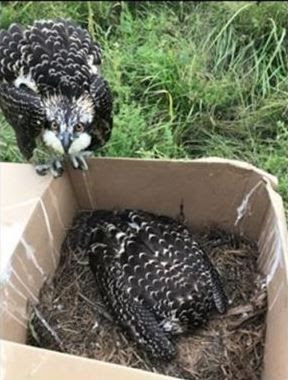
DEC Environmental Conservation Police Officer Highlights |
ECO Actions for Late July
New York State Department of Environmental Conservation (DEC) Environmental Conservation Police Officers (ECOs) enforce the 71 Chapters of NY Environmental Conservation Law, protecting fish and wildlife and preserving environmental quality across New York. In 2017, the 301 ECOs across the state responded to 26,400 calls and issued 22,150 tickets for crimes ranging from deer poaching to corporate toxic dumping and illegal mining, black market pet trade, and excessive emissions violations. “From Montauk Point to Mount Marcy, from Brooklyn to Buffalo, the ECOs patrolling our state are the first line of defense in protecting New York’s environment and our natural resources, ensuring that they exist for future generations of New Yorkers,” said Commissioner Basil Seggos. “They work long and arduous hours, both deep in our remote wildernesses and in the tight confines of our urban landscapes. Although they don’t receive much public fanfare, the work of our ECOs is critical to achieving DEC’s mission to protect and enhance our environment.” Recent missions carried out by ECOs include:
Illegal Clamming – Queens County On July 16, ECOs Daniel Plows, Matthew Thibodeau, and Ryan Wing were returning from a briefing in Long Island when they received a call from the National Park Service about people clamming in Jamaica Bay Wildlife Refuge. The ECOs responded and found five individuals harvesting clams. The ECOs waited for several of the subjects to come ashore with their catch before they revealed themselves. In total, the ECOs counted 435 clams (20 undersized) harvested from uncertified waters. The ECOs issued 10 summonses to the individuals for harvesting shellfish from uncertified waters and possession of undersized hard-shell clams, returnable to Queens County Court.
Stuck in the Mud — Broome County On July 23, Lt. Ric Warner came upon several Binghamton Police Department officers looking down on a large van stuck in the Susquehanna River in Binghamton. The Binghamton officers were waiting for the responsible party to remove the vehicle from the river. Lt. Warner directed ECO Tony Rigoli to investigate the case. ECO Rigoli discovered that the subject had been fishing and partying the evening before and drove his father’s van into the river bed, getting it stuck to the axles in the soft river bottom. ECO Rigoli located the wayward driver and issued a ticket for disturbing the bed of a protected stream.
Illegal Fishing Net – Sullivan County
Chicken-Fried Storm Drain – Onondaga County On July 24, ECO Don Damrath received a call from an Onondaga County Water Environment Protection engineer requesting assistance with an investigation. While inspecting storm drains and sewers in Salina following recent heavy rains, the engineer observed large amounts of grease in several storm drains near a local fast food restaurant’s parking lot. ECO Damrath arrived and observed evidence of food grease being dumped directly into a storm drain behind the restaurant. The grease had congealed and was covering the grates, pipes, and walls of the sumps. Despite the overwhelming evidence, the manager denied any knowledge of the grease dumping. ECO Damrath charged the manager with disposing a noxious/offensive substance into public waters, a misdemeanor. The investigation is continuing, and additional charges may be filed.
Undersized Crappies – Saratoga County
Osprey Release – Washington County
Fluke After the Storm – Richmond County On July 28, ECOs Dustin Osborne and Michael Wozniak conducted recreational and commercial fishing enforcement in Richmond County following heavy rainfall, flooding, and storms in Staten Island. The ECOs checked numerous vessels as they returned to the boat launch and marina at Great Kills National Park. There, they discovered one subject in possession of a short fluke, which he presumed to be of legal size until he realized his measuring tape was missing some inches. The ECOs continued their enforcement, checking three fishermen just outside of the Great Kills Park at Fox Beach, where the group was in possession of another undersized fluke and 134 mussels taken from the uncertified waters of New York City. From there, ECOs received a complaint of fishermen keeping short fluke at Ocean Breeze Pier in Staten Island, where the suspect was in possession of three undersized fluke, two of which were mutilated. In total, the ECOs issued 11 summonses for failing to carry marine registry, possession of undersized fluke, mutilating species so that size cannot be determined, and taking shellfish from uncertified waters.
What’s in the Cooler? – Fulton County On July 29, ECOs Steve Shaw and Robert Higgins were conducting a boat patrol on Great Sacandaga Lake when they noticed a rowboat with two fishermen and a stringer of fish off the side of their boat. The fishermen, a father and son out for the morning, were checked by the ECOs for fishing licenses and floatation devices, which the pair properly possessed. The officers then turned their attention to the stringer full of fish, which revealed legal-sized bass, bullhead, walleye, and perch. The ECOs then asked the fishermen what was in the cooler. The pair reluctantly opened the cooler to produce two more walleye, which appeared to be undersized. After the ECOs measured the fish and confirmed they were undersized, the two fishermen were issued tickets for taking undersized walleye.
|








